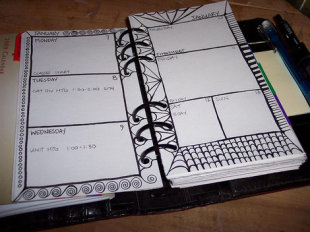By Martha Beck | Oprah.com
She generally gave herself very good advice (though she very seldom followed it)." That's what Lewis Carroll wrote about Alice, and it's true of most people. We go through life generally getting good counsel about what's best for us—and then vigorously ignoring it. This explains why I never run out of clients. It's amazing: Intelligent adults pay me for advice so obvious worms can follow it (this, as we'll see, is no exaggeration), then fail to act on it, then pay me to advise them again.

Photo: Ann Cutting
Here and now, out of sheer guilt, I've decided to spell out the best—and, mysteriously, most ignored!—advice I possess. If you follow it, I guarantee the results will be positive. If you don't, at least you won't be alone.
1. What leaves you feeling bad, do less of. What leaves you feeling good, do more of.
This one suggestion is all you really need to find your destiny, form loving relationships, achieve optimal health, and have the best life story in the bingo parlor during your golden years. And it isn't hard to remember, judging by the fact that worms easily take it to heart. Put a worm at the bottom of a simple T-shaped maze, with food in the left side of the top and a mild electric shock in the right, and it will develop fervent leftist inclinations. Yet many clever humans turn repeatedly to the very things that ruin our health and happiness: artery-clogging junk food, alcoholic lovers, soul-crushing jobs.
We do this because, unlike worms, we convince ourselves that there are good reasons to do ourselves harm. We say things like "I had a hard day; I deserve this industrial-size bag of chips." Or "You always hurt the one you love." Or "But I need the paycheck!" Yet I believe all human beings—even politicians—are born with the capacity for suffering and joy for a reason: so that we can navigate the world as well as a worm.
Notice that I'm putting the emphasis on how something leaves you feeling, not on how you imagine it will make you feel. Worms have to experience a maze several times before they start making optimal decisions. Once the experience registers, however, they trust it. Not so with us. We overthink experience—and end up bedazzled by the same electricity that Tasered our last relationship, or disdaining the simplicity of things that reliably nourish us.
Today, try pausing before any action you take and recall how that action made you feel in the past. For example, writing often seems frightening or burdensome to me before I start, yet as many writers before me have said, I love having written. On the other hand, while nothing seems more appetizing to me than baked goods, I know that both wheat and sugar leave me feeling droopy and queasy. Just pausing to vividly recall the past result of each action helps me choose writing over procrastination and bananas over cookies. If you think through how each action leaves you feeling, you'll find yourself more and more able to choose those that add up to your best life.
2. To achieve bigger goals, take smaller steps.
As a teenager, I often injured myself trying to run mountain trails. Then I noticed that bikers downshift to climb hills. I began mimicking them, taking steps so tiny they felt inconsequential. This allowed me to run uphill quickly without getting tired, winded, or hurt. The one race in which I actually placed was on a mountain trail where I scurried along like a mouse on a mission, zipping past runners whose gazelle-like leaps were taxing their lungs and ruining their knees.
It turns out that the tiny-steps approach applies to any difficult thing, from schoolwork to parenthood to career. The bigger the task, the smaller my steps. If I feel myself tiring or avoiding tasks, I cut my steps in half, then in half again, until each step feels easy. Between steps, I give myself a reward—nothing huge, just a ten-minute nap in the sun, a smoothie, some online window shopping.
My clients find this shocking. They want to achieve big goals, and they love those spectacular, gazelle-like leaps. One client I'll call Roberta planned to start getting up two hours early each morning, running to the gym, and lifting weights before work. She'd had this plan for five years. She hadn't acted on it once. I suggested that, instead, she get up five minutes early, put on gym clothes, then have coffee—full stop. She thought this ridiculous (they always do), but it worked (it usually does). Roberta's five minutes in gym clothes grew to ten, then to 15, then to a Zumba class she loved. She's still increasing her fitness, one tiny step at a time.
3. Lie down and rest for a while.
Speaking of health regimens, there's a big piece of getting fit that most of us shortchange: rest. The majority of my clients who complain of depression, anxiety, irritability, and weight gain are actually chronically tired. The problems caused by lack of rest can feel so intricate, but the solution is so simple: Lie down, dear. Just lie down.
If you've ever attended a meeting after lunch, you know the mild coma endocrinologists call postprandial dip, which makes you want to lay your head down and drool during your boss's PowerPoint presentations. And why not? Totally relaxing for just ten minutes can reenergize your body, sharpen your mind, and make you much less likely to weep when you can't find a stapler.
In many cultures, it's customary to lie down during the day. In ours, it's emphatically not. To get used to the idea anyway, try a yoga class or the Alexander Technique, which you can do on the floor—any floor, even at work (instructions available online). If all else fails, just channel your inner worm.
4. When you don't know what to say, try the truth.
I won't lie: Investing in resting can cause social awkwardness. For example, an acquaintance I'll call Jill recently asked me to drive an hour (each way) to meet her for dinner. I was exhausted, and though I like Jill, I've learned the hard way that when I put politeness over basic needs, I end up feeling resentful, which damages the relationship.
When I suggested that Jill and I take a rain check, she frostily asked what could possibly be more important than a chance to connect with her. I tried to invent a fictional business trip or convincing symptoms of bird flu, but my perfidious mouth blurted the truth: "I want to lie down."
I felt Jill's outrage as she absorbed the fact that on my priority list, getting some rest outranked dining with her. Truth often has this effect, but despite the initial sting, it makes for stronger relationships. If I'd lied, I'd have misled Jill and angered myself. I want friends who want what's best for me, and Jill can either accept that or find someone who's willing to dine under duress.
No matter what your truth may be—about political views, movie preferences, the desire to live "off the grid" eating roadkill—calmly expressing it cuts a clear path through the jungle of social connection.
5. Free yourself from dysfunctional people by refusing to try to control them.
You don't even need to say it—I can already hear you thinking: If I tell the truth in every awkward situation, there will be hell to pay with my mother/husband/sister/coworker/book club! I get it: There are people in your life who, for various reasons, don't want your truth. You may think you have to change those people to live in total authenticity. Don't even try.
I labored for decades to make sad people happy, rigid people flexible, aggressive people empathetic, and so on, before finally noticing that (1) this never worked, and (2) it drove me insane. Then I read codependency expert Melody Beattie's advice on how to deal with dysfunctional people: "Unhook from their system by refusing to try to change or influence them." This felt totally alien and absolutely right, and it works. The key, I've found, is to stay the heck away from the idea of "making" someone do, feel, or think anything. This is not your job. Your job is to maximize your own happiness, kindness, and health. Let others choose whether to follow.
At this point, I should note that Alice in Wonderland did take some of her own advice. She remembered, for example, that "if you drink much from a bottle marked 'poison,' it is almost certain to disagree with you, sooner or later."
You've already had enough life experience to notice when a situation, a person, or a task is marked "poison." Remember how much that situation hurt the last time, and choose one that feels better now. Take small steps, lying down often along the way. Tell the truth and stay in your own business. Anything else is poison. And if you actually use this seldom-followed advice, you may one day wake up and realize that your life has become a wonderland.
Read More Self Improvement Articles











